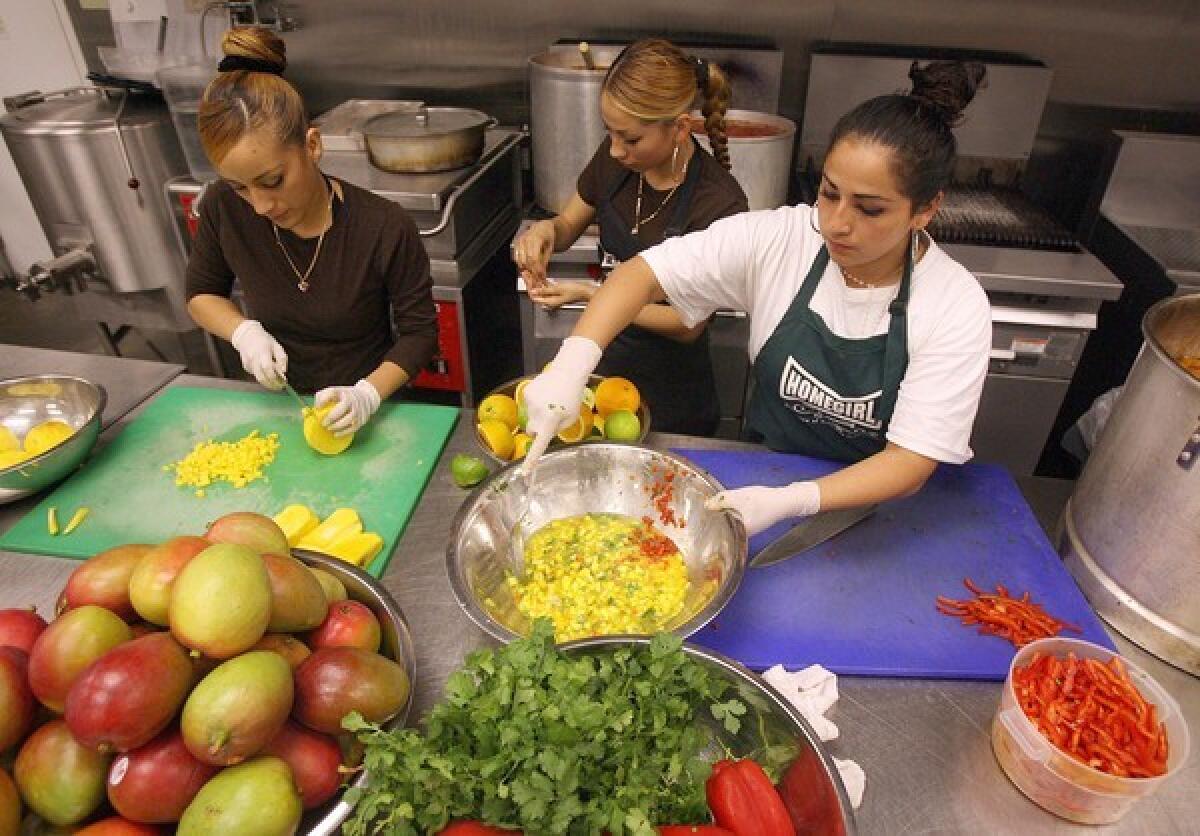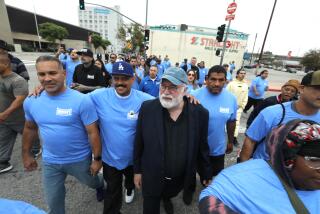Ralphs store to sell salsa prepared by Homegirl Cafe

- Share via
Homegirl salsa is about to find a home at the deli counter of Ralphs Grocery Co.
Salsa made by women in Homeboy Industries’ Homegirl Cafe & Catering job training program will be sold at the chain’s downtown Los Angeles store starting today.
It is part of an initiative by Ralphs to help the L.A. gang-intervention agency learn how to commercialize its products.
“Finding commercial outlets for our food products will allow us to generate more revenue, employ more people and do more job training, said Mary Ellen Burton, chief financial officer of Homeboy Industries Inc., which operates the Homegirl Cafe, a landscaping business and a silk screen shop as part of its efforts to steer younger residents in some of the city’s toughest neighborhoods from gang life.
In the highly competitive supermarket world, Homeboy Industries is getting a break. Normally, it would be almost impossible for a start-up food company to even get a meeting to pitch a new product to a major supermarket chain.
Food manufacturers are often asked to pay the grocery companies money -- called slotting fees, new item merchandising allowances or promo dollars -- to launch a product. The charges can begin at $10,000 and run into the six-figure range, industry experts and food companies say.
But some segments of the industry waive such expenses for small, local and minority-owned businesses, according to industry analysts. Still, “a new company would have to start with independent grocers and small chains and show a larger retailer that they have a program that works,” said Norris Bernstein, an industry consultant who helps businesses get products into grocery chains.
Homeboy Industries, founded 21 years ago by Father Gregory Boyle, a Jesuit priest, provides job training for about 450 formerly gang-affiliated youth annually. The nonprofit organization says it provides legal, psychological and addiction counseling services for an additional 12,000 youth along with academic tutoring and job training in industries such as food service and solar power. The participants can even have their gang tattoos removed.
The Homeboy Bakery and accompanying Homegirl Cafe do about $2.5 million in sales annually, but this will be the organization’s first venture into a major food retailer. The agency’s budget is about $9 million, with the rest of the money coming from private foundations, individual contributions and government grants.
Initially, Ralphs will sell two types of salsa, Homegirl Mango and Homegirl Molita, for $3.99 a pound.
“We are starting with salsa in the deli counter and hope to expand to packaged salsa and hummus in the refrigerated case,” Burton said.
The grocer was looking for a distinctive product made near downtown L.A. to sell at its store on West 9th Street (one of the chain’s busiest), and approached Homeboy Industries.
Ralphs will be the first retailer to sell a Homegirl product. The agreement is part of Ralphs’ support for Homeboy Industries that includes a $25,000 grant, product donations and job training for women participating in the Homegirl Cafe & Catering program.
“Ralphs is committed to supporting community organizations in California, and we believe this is a different approach to doing just that. Our intention was to find a sustainable way to support Homeboy Industries and bring a quality product to our customers at the same time. This accomplishes both of those goals,” said Mike Donnelly, president of Ralphs.
It also is a good move for the supermarket chain, consultant Bernstein said.
“Ralphs understands that Homeboy is creating jobs and teaching kids how to work,” Bernstein said. “That is a compelling story that could transform the salsa into a serious food product.”
twitter.com/latimesjerry
More to Read
Inside the business of entertainment
The Wide Shot brings you news, analysis and insights on everything from streaming wars to production — and what it all means for the future.
You may occasionally receive promotional content from the Los Angeles Times.











